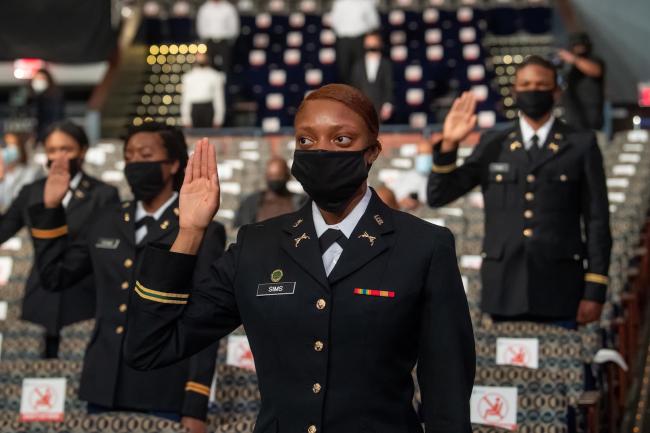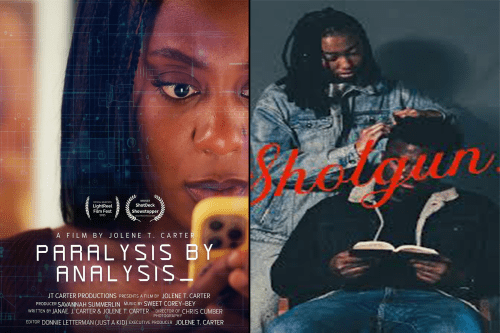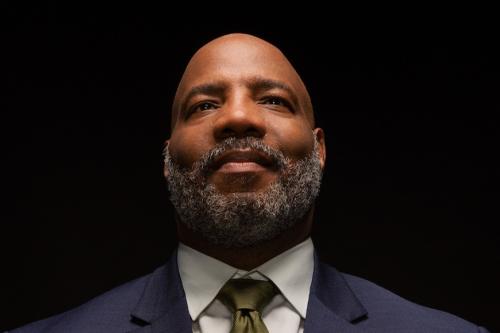There is a broad and extensive list of noteworthy leaders who have called Howard University their home. From Kamala Harris and Thurgood Marshall in politics, to Taraji P. Henson and Chadwick Boseman in the arts, and alumnus and current faculty member Ta-Nehisi Coates in journalism and literature, there is something distinctive about the Howard experience that empowers our students to lead.
Of course, the Howard leadership journey begins in the classroom, where skills are learned and knowledge is acquired that students will lean on as leaders for the rest of their lives. But a major component of Howard’s active and intentional cultivation of leaders takes place outside the academic arena – like on the football field or in the swimming pool.
“We want to make sure athletics is integrated into the curriculum,” says Kery Davis, director of athletics at Howard. “In athletics, one of the things that we aspire to do is to have our mission reflect the mission of the University, which is to nurture the next wave of young leaders in this country, students who are going to make a difference, students who are going to be change agents. … We expect our student-athletes to be leaders on campus.”
Davis mentions how so many leaders who are Howard alumni decided to pursue collegiate athletics during their academic careers. Andrew Young, the former mayor of Atlanta and ambassador to the United Nations, was a member of the Howard University swimming team as an undergraduate student. Since Davis became athletic director in 2015, Howard student-athletes have gone on to make a difference in a wide array of industries. Some have worked in politics for then-Senator Kamala Harris and former President Barack Obama. Others have gone on to work at JPMorgan Chase and Under Armour. Others have stayed at Howard to serve as coaches who train other student-athletes and cultivate future leaders.
"We expect our student-athletes to be leaders on campus."
Athletics provides experiences that help build and reveal the character traits that are essential for leadership.
“First, it starts with having to work together as part of a team,” Davis says, “to put aside individual egos to try and attain a specific goal.” Davis also says student-athletes have a competitive spirit, self-confidence and self-discipline, the ability to overcome adversity, and the list goes on.
“The strengths and weaknesses that show up on the football field or the basketball court reflect the strengths and weakness that will show up in the classroom or the boardroom,” Davis says. One of the benefits of athletics is that you have an opportunity to work on these personal attributes in a challenging setting with the support and tutelage of coaches and mentors.
The opportunity to practice leadership is also a hallmark of the Reserve Officer Training Corps (ROTC) at Howard.
“I think Howard cultivates leaders by giving us experiences that we may not have had if we hadn’t gone to Howard University,” says Lt Col Redahlia Person, department chair of military science for Air Force ROTC. She is responsible for educating and training Air and Space Force cadets in the D.C. area at Howard University.
“We take students from high school onto campus, and we’re teaching them how to be leaders. And it’s not just leaders in a normal environment, but leaders under stress that can adapt, that are reflective, and that can overcome challenging situations,” says LTC Creyonta West, department chair of military science for Army ROTC. “When we have our culminating event for our cadets, [we train them] in a simulated combat environment. You really won’t understand what type of leader you are until you’re put in a stressful situation.”
“You have [to have] that character that people will want to emulate and follow."
According to Lt Col Person and LTC West, ROTC also focuses on character development in addition to leadership development. Since leaders never lead in a vacuum, they have to inspire others to follow them, and they, in turn, need to understand how to lead from behind in addition to formal positions of power.
“You have [to have] that character that people will want to emulate and follow,” LTC West says. “[Leadership is] not just managing others.”
“You have to be able to influence people to bring the best out of everybody involved. And I think that’s what Howard does,” says Lt Col Person. “In order to be a good leader, you have to make sure everybody’s voices [are] being heard.”
Perhaps most importantly, it is Howard’s service orientation that provides a critical foundation for those who are learning how to be leaders on our campus. Institutions like Howard University Alternative Spring Break (HUASB) help student-leaders understand how their leadership directly affects the magnitude of impact of Howard’s service efforts. The students who take charge of HUASB select site locations, coordinate logistics and recruit student volunteers. Without their capable leadership, the program would not have had the impact that it has over the years. Other organizations, like the Howard University Debate Team, certainly teach students new skills while also ensuring they understand how to use those skills for good. For instance, when Vice President Harris was on the debate team, she didn’t just learn how to win arguments – she learned how to use the power of her voice to help the voiceless, the powerless and the underprivileged.
“[There is] one thing that stands out about how we lead. [Often], we look at [leaders] being the point people on key decisions. But I think one thing that a lot of people forget is that we really serve,” LTC West says. “We serve and sacrifice. People don’t understand leadership is not about being up front and calling the shots. It’s about really serving, serving the community, serving your nation. I think it’s that servant leadership that the military [and] Howard do a very good job of [teaching]. Servant leaders are willing to sacrifice their well-being, sacrifice their comfort, to lead others to a greater vision.”





